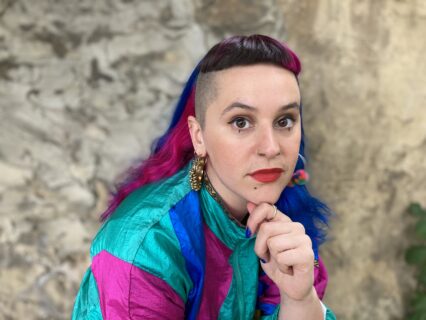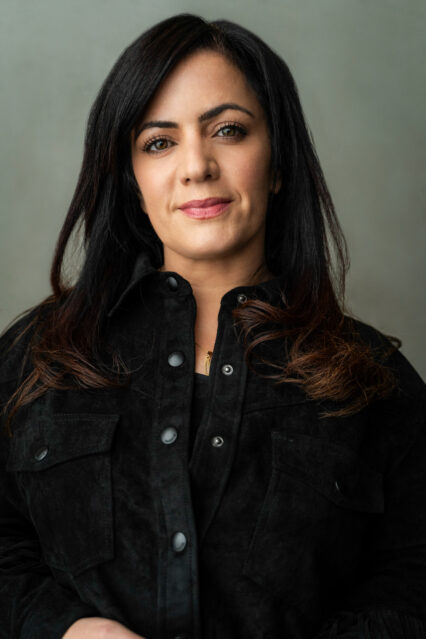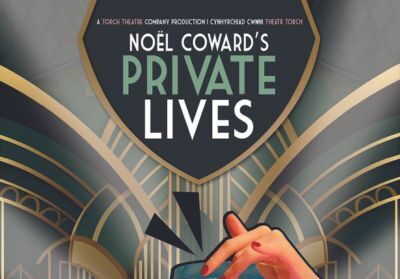As Lisa Zahra prepares to open her new play at this month, Rhys Edwards sat down to discuss writing and the rhythm of voices, with Lisa and director, Izzy Rabey.
Lisa Zahra doesn’t think of herself as a writer. This is despite the fact that she has written a new play – Baba Joon, directed by Izzy Rabey – that is set to premiere at the Swansea Grand Theatre later this month.
This is Lisa’s first play, and for the time being at least, she has no plans to write another.
‘I haven’t got the writer’s bug, no. I’m an actor, first and foremost.’ Lisa tells me, as we meet at the Swansea Grand.
I wonder whether this will make the play all the more impactful, knowing that her writing itch has well and truly been scratched. Is it indicative of her confidence in the piece – having said exactly what she wanted to say, precisely how she wanted to say it?
Director Izzy Rabey, who joins us in a break from rehearsals, is inclined to agree: ‘When I first read the script, I just thought it was so poetic. It really celebrates the reality of mixed heritage – but embraces all of the messiness and complexity and pride in it. Lisa really has expressed this story so beautifully.’
Lisa’s switch from actor to writer was never part of the plan and yet, as she reflects on the last few years of her career, she recognises that in many ways it was inevitable: ‘When I look back at my recent run of projects, it’s like they have all been leading to this.’
Over the last few years, Lisa has performed in the West End production of The Kite Runner, the BBC series Phoenix Rise and has also featured in National Theatre productions of The Boy with Two Hearts and most recently, Grenfell.
‘I have been working on a number of productions that have dealt with themes of immigration, community and belonging – and I think these roles inspired me and also prepared me to reflect on my own story.’
Lisa’s mother is Welsh, and her father is Iranian – he arrived in Swansea in the 1970’s at fourteen-years-old on ‘a random day trip’ and decided there and then to make the city his home. It was following the COVID-related cancellation of a Broadway run of The Kite Runner that Lisa felt compelled to reflect on her past, particularly how she navigated her sense of identity when she was younger.

‘I was still reeling from my experiences with that production – and then during the pandemic, I first considered exploring what I was feeling through writing’.
She submitted the first draft of what would become Baba Joon to the Royal Court Theatre and subsequently, was selected for the theatre’s writing programme. Mentors at the Royal Court calmed her initial anxieties around writing. ‘I was nervous about structure and “the rules”, but they encouraged me from the outset not to worry too much about that side of things – their approach was to say, if you are writing something that is true, then that is enough’.
Baba Joon combines poetry and spoken word – a form that Lisa was instinctively drawn to when she started writing the script. I ask if she found this more difficult than approaching the piece as a straight monologue.
Lisa doesn’t think so: ‘The Welsh are poets, aren’t they?’ she says. ‘I just think it’s in us.’
This thought prompts Lisa to consider commonalities between her two cultures. ‘It’s actually exactly what comes to mind when people think of Isfahan too – Wales and Iran both have a reputation for having a rich language associated with poetry and song.’
‘When my father first came to Swansea, he thought people were singing to him. When he first heard the Welsh accent, he said it sounded like music. I think our voices just have a natural rhythm…’
The script, which was developed through the Royal Court, eventually made its way to The Other Room Theatre in Cardiff. As a Swansea-based story, Grand Ambition were then approached as the natural producing partners – Grand Ambition being a company that aims to put Swansea at the heart of each of their productions.
Lisa calls Swansea her ‘little cwtch.’
‘It’s just my home – it’s in me wherever I go – it’s all of my most treasured memories. It’s where I feel safest, calmest, just at peace.’
Izzy Rabey suggests that Swansea is a character in the play in its own right. ‘Reading the play was a real education for me about Swansea itself. I felt like it invited me in to become a part of what makes this city so special.’
Baba Joon presents Izzy with a unique opportunity. She is driven by the concept of what it means to be Welsh, keen to dissect all the multitudes of perspectives associated with collective national identity. ‘With every new project, I approach it from a place of wanting to interrogate what Welsh identity means to individuals but also to the people of Wales as a whole.’
These themes are at the heart of Baba Joon, which is why she feels that she is the right person to help bring it to the stage. ‘It’s as if this is my chance to bat away all the imposter syndrome I have been feeling in this industry for years.’

I get the impression that neither Lisa nor Izzy want Baba Joon to be easy to define. The story is both an evocative portrayal of a young man arriving in 1970’s Wales and a journey of a young woman wrestling with her identity in the 1990s. It incorporates both Welsh language and Farsi, and it’s soundtracked to traditional Iranian music blended with 90’s dance. One thing is for certain, Baba Joon is not one thing.
Izzy says, ‘What I really love about this piece is that it asks questions about what it means to be both Welsh and Iranian, but it doesn’t necessarily answer those questions, it’s more about celebrating those complex, conflicting feelings, the idea of not being brown or white enough, what it really means to belong to different cultures.’
‘This isn’t just my story.’ Lisa is also keen to point out. ‘It’s a story about families and parental relationships – that I think everyone can relate to.’
On this subject, Izzy interjects excitedly, ‘You know what else this play is about? Food.’
“Honestly, I was sat in rehearsals this morning, just thinking to myself – so much of this play is about food!”
Lisa laughs at this, but couldn’t agree more. “No, this really is a play for food lovers!”
Both Izzy and Lisa momentarily divert into a sub-chat about their shared fascination with how different people and cultures can forge connections through food. Izzy says, ‘It’s such an important part of culture – and certain dishes can really fuel nostalgia, can’t they? They define people’s ideas of home.’
Baba Joon has undoubtedly been an ambitious undertaking. Perhaps it’s no wonder that for now, Lisa doesn’t have her sights set on writing another play. Whether it’s Welsh identity, Iranian heritage, mothers, fathers, the concept of home or the prospect of sharing a meal that celebrates who you are and where you’ve come from – with her debut, she has set out to share a lifetime’s worth of personal reflections and experiences that are both specific and universal.
“I just hope I have been able to communicate an authentic perspective of what it’s like to grow up with mixed heritage, but in doing so, show how my personal and specific story, covers such common ground that ultimately links us all…”
Baba Joon will open at the Swansea Grand Theatre, performing between 17 – 21 October. For further information, visit the Theatre’s website.











